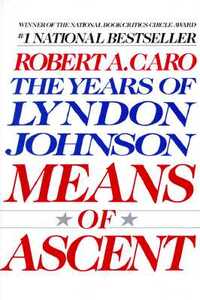Take a photo of a barcode or cover
The second book to Robert Caro's epic series on LBJ. Shorter than the first, with some overlap, but this book took on a more personal note... especially the senatorial election of 1948 between LBJ and Coke Stevenson. This book may have been a biography to LBJ, but it was also a love note to Coke Stevenson. Highly recommended!
informative
Robert A. Caro is an amazing researcher and researches the entire environment surrounding his subjects to give you the full context. I absolutely love his writing and despite the length and subject (I don't even like politics!) it is fascinating.
This is book 2 of 4 about lbj and his rise to power. It primarily covers his use of his own political power to make himself very wealthy followed by his stealing of the 1948 senate election from coke Stephenson. Most biographies leave you feeling live you had just read about a great man. This one does as well but his greatness was all around cheering and stealing. He was probably the greatest cheater and stealer in American political history (which puts him high in the running for greatest cheater and stealer in this history of mankind).
While this book cannot compare to the first volume, The Path to Power, it is still an excellent book. Great insight to the making of Lyndon Johnson.
Apparently 35% of this book is notes/bibliography/index so I finished it sooner than anticipated?! Anyway, this one gets 4 stars because I ended up skimming a bit of the drier sections but the election drama at the end was riveting.
Mostly a recollection of the 1948 democratic primary election between LBJ and Coke Stevenson. It's rare that a biographer has such an open contempt for the subject of the biography, and Caro does a good job of communicating the reasons for that contempt, portraying Johnson as mercurial and willing to do anything to satisfy deep psychological needs; the need to be seen as practical, the need for power over other people and recognition from them.
The most striking episode from Caro's telling was, for me, how Johnson rationalized receiving support from the ultra conservative corporate bosses by giving a backwards speech vilifying unions to the point where he had convinced himself of the things he was saying. This was the man who got the Great Society passed and signed the 1964&65 Civil and Voting Rights Acts! You want to say to yourself, ok, I believe many of these means are justified if it's to beat a reactionary and to pass programs like Johnson had passed when he was in the Senate and as president, but reading Caro's account of Johnson doing anything short of assassinations and coups to reach the Senate really does make you wonder where the man really stood on anything.
The most striking episode from Caro's telling was, for me, how Johnson rationalized receiving support from the ultra conservative corporate bosses by giving a backwards speech vilifying unions to the point where he had convinced himself of the things he was saying. This was the man who got the Great Society passed and signed the 1964&65 Civil and Voting Rights Acts! You want to say to yourself, ok, I believe many of these means are justified if it's to beat a reactionary and to pass programs like Johnson had passed when he was in the Senate and as president, but reading Caro's account of Johnson doing anything short of assassinations and coups to reach the Senate really does make you wonder where the man really stood on anything.
informative
medium-paced
Another Caro classic that is essential listening.
As a frequent reader of science fiction and fantasy, I am accustomed to consuming works that wind up feeling interstitial. Authors pursuing grand narratives often have set beats that they want to hit between major plot milestones and those beats, essential though they are, are sometimes puffed up larger than they need to be to justify standing on their own.
That is certainly what Means of Ascent feels like. The essential plot point is that in 1948, Lyndon Johnson steals a Senate election from Coke Stevenson. Texas politics was always dirty and a certain amount of paid rigging has long been the name of the game. But the point Caro is keen to make is that, even by the standards of the time, Johnson's efforts to secure a Senate seat was exceptional. And, moreover, that this effort is a revealing illumination of his true character.
But it takes a long time to get there. The majority of the book is made up of smaller, though no less illuminating explorations of LBJ's doings:
• There's his incredibly brief military service that he nonetheless turns into a political instrument. He embroiders a single story acting as an observer on a mission into a tale of heroism and patriotism.
• There are several chapters about his radio business that he secured thanks to access to the FCC and that would turn into a media empire that kept his family financially independent.
• Lady Bird Johnson is discussed in some detail. He paints her as a sympathetic character faithful to her husband despite his mistreatment of her.
• And in the chapters preceding the election day fraud, he also spends a lot of ink discussing Johnson's novel use of a helicopter as a campaign tool.
It's not hard to start drowning in the details of these chapters because, unlike the election fraud story, it's sometimes hard to see how they connect to their overarching narrative.
Caro also spends a lot of time talking about Johnson's principal opponent in the Senate election: Coke Stevenson. Often these background chapters can be Caro's most interesting, where he takes his time to sketch out side characters. They're usually a nice break from the constant stream of awful things Johnson does.
In Stevenson's case, as others have explored, it seems Caro spent a little too much time and energy trying to build up Stevenson as his foil to LBJ. There are definitely aspects of his story -- particularly his early life and ascent into politics -- that are particularly compelling. It also took outside reading on the subject to learn that his popularity in his time was forgotten to history when Caro wrote these books. Johnson loyalists went to some lengths to smear Stevenson's record and history is written by the victor.
Less forgivable in my view is the light strokes that Caro gives to Stevenson's racist and segregationist views. He defended these views after this book was published, arguing that because these views were conventional for Texas at the time and because LBJ didn't really represent a contrasting view, they were not relevant to the nature of the election at the time.
This seems a strange tack to take given that LBJ supporters have since tried to use the glow from the Great Society to retell history and pretend that their man in any way supported people of color. The issue is nonetheless relevant, both when you're trying to build Stevenson up as your hero and for future purposes for undermining Johnson's later narratives about himself.
In any case, like any good interstitial work, Means of Ascent has you wanting to read more to see how things turned out for this gangly, selfish, amoral climber, and in that sense I still feel compelled to call it a success.
That is certainly what Means of Ascent feels like. The essential plot point is that in 1948, Lyndon Johnson steals a Senate election from Coke Stevenson. Texas politics was always dirty and a certain amount of paid rigging has long been the name of the game. But the point Caro is keen to make is that, even by the standards of the time, Johnson's efforts to secure a Senate seat was exceptional. And, moreover, that this effort is a revealing illumination of his true character.
But it takes a long time to get there. The majority of the book is made up of smaller, though no less illuminating explorations of LBJ's doings:
• There's his incredibly brief military service that he nonetheless turns into a political instrument. He embroiders a single story acting as an observer on a mission into a tale of heroism and patriotism.
• There are several chapters about his radio business that he secured thanks to access to the FCC and that would turn into a media empire that kept his family financially independent.
• Lady Bird Johnson is discussed in some detail. He paints her as a sympathetic character faithful to her husband despite his mistreatment of her.
• And in the chapters preceding the election day fraud, he also spends a lot of ink discussing Johnson's novel use of a helicopter as a campaign tool.
It's not hard to start drowning in the details of these chapters because, unlike the election fraud story, it's sometimes hard to see how they connect to their overarching narrative.
Caro also spends a lot of time talking about Johnson's principal opponent in the Senate election: Coke Stevenson. Often these background chapters can be Caro's most interesting, where he takes his time to sketch out side characters. They're usually a nice break from the constant stream of awful things Johnson does.
In Stevenson's case, as others have explored, it seems Caro spent a little too much time and energy trying to build up Stevenson as his foil to LBJ. There are definitely aspects of his story -- particularly his early life and ascent into politics -- that are particularly compelling. It also took outside reading on the subject to learn that his popularity in his time was forgotten to history when Caro wrote these books. Johnson loyalists went to some lengths to smear Stevenson's record and history is written by the victor.
Less forgivable in my view is the light strokes that Caro gives to Stevenson's racist and segregationist views. He defended these views after this book was published, arguing that because these views were conventional for Texas at the time and because LBJ didn't really represent a contrasting view, they were not relevant to the nature of the election at the time.
This seems a strange tack to take given that LBJ supporters have since tried to use the glow from the Great Society to retell history and pretend that their man in any way supported people of color. The issue is nonetheless relevant, both when you're trying to build Stevenson up as your hero and for future purposes for undermining Johnson's later narratives about himself.
In any case, like any good interstitial work, Means of Ascent has you wanting to read more to see how things turned out for this gangly, selfish, amoral climber, and in that sense I still feel compelled to call it a success.
challenging
informative
reflective
medium-paced
funny
informative
reflective
slow-paced


